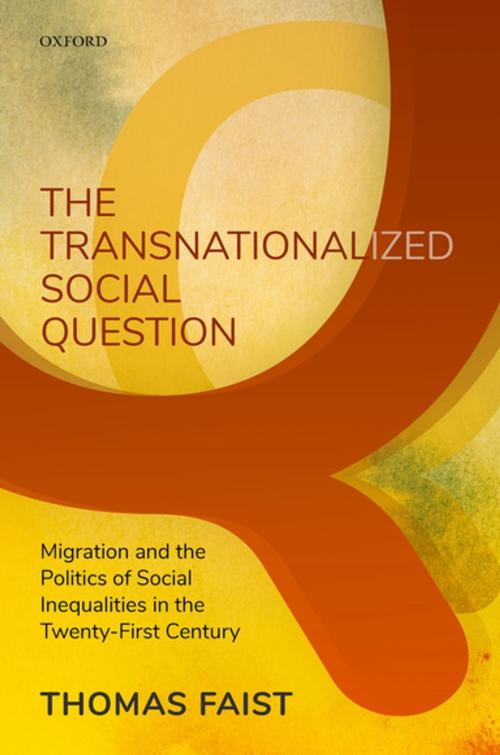The Transnationalized Social Question
Migration and the Politics of Social Inequalities in the Twenty-First Century
Nonfiction, Social & Cultural Studies, Political Science, International, International Relations, Social Science| Author: | Thomas Faist | ISBN: | 9780192570925 |
| Publisher: | OUP Oxford | Publication: | November 30, 2018 |
| Imprint: | OUP Oxford | Language: | English |
| Author: | Thomas Faist |
| ISBN: | 9780192570925 |
| Publisher: | OUP Oxford |
| Publication: | November 30, 2018 |
| Imprint: | OUP Oxford |
| Language: | English |
The social question is back. Yet today's social question is not primarily between labour and capital, as it was in the nineteenth century and throughout much of the twentieth. The contemporary social question is located at the interstices between the global South and the global North. It finds its expression in movements of people, seeking a better life or fleeing unsustainable social, political, economic, and ecological conditions. It is transnationalized not only because migrants and their significant others entertain ties across the borders of national states, staying in touch with family and friends, receiving or sending financial remittances in transnational social spaces. Also of importance are cross—border recruitment schemes for workers and the cross-border diffusion of norms appealed to in the case of migration—for example, the social right to decent work as a human right. Moreover, migration can become an issue of inclusion or exclusion in fields important to life chances in the emigration, transit, or immigration states—a transnationalization of national states. And, as in the nineteenth century, political conflicts arise, constituting the social question as a public concern. In earlier periods class differences dominated conflicts. While class has always been criss-crossed by manifold heterogeneities, not least of all cultural ones around ethnicity, religion, and language, it is these latter heterogeneities that have sharpened in situations of immigration and emigration over the past decades. Casting a wide net in terms of conceptual and empirical scope, this book tackles both the social structure and the politics of social inequalities. It sets a comprehensive agenda for research which also includes the public role of social scientists in dealing with the transnationalized social question.
The social question is back. Yet today's social question is not primarily between labour and capital, as it was in the nineteenth century and throughout much of the twentieth. The contemporary social question is located at the interstices between the global South and the global North. It finds its expression in movements of people, seeking a better life or fleeing unsustainable social, political, economic, and ecological conditions. It is transnationalized not only because migrants and their significant others entertain ties across the borders of national states, staying in touch with family and friends, receiving or sending financial remittances in transnational social spaces. Also of importance are cross—border recruitment schemes for workers and the cross-border diffusion of norms appealed to in the case of migration—for example, the social right to decent work as a human right. Moreover, migration can become an issue of inclusion or exclusion in fields important to life chances in the emigration, transit, or immigration states—a transnationalization of national states. And, as in the nineteenth century, political conflicts arise, constituting the social question as a public concern. In earlier periods class differences dominated conflicts. While class has always been criss-crossed by manifold heterogeneities, not least of all cultural ones around ethnicity, religion, and language, it is these latter heterogeneities that have sharpened in situations of immigration and emigration over the past decades. Casting a wide net in terms of conceptual and empirical scope, this book tackles both the social structure and the politics of social inequalities. It sets a comprehensive agenda for research which also includes the public role of social scientists in dealing with the transnationalized social question.















